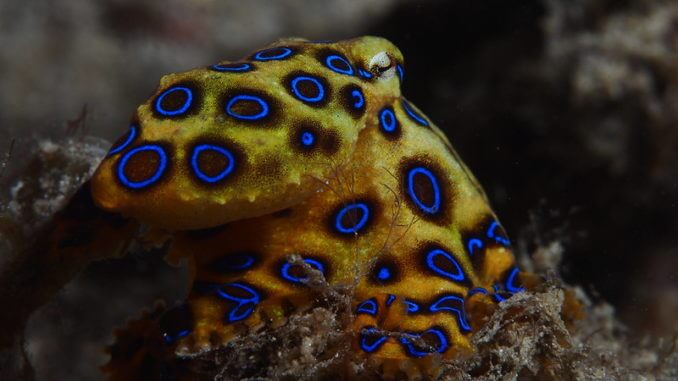We use affiliate links to run our site. When you buy through links on our site, we may earn an affiliate commission, without any added cost to you. Learn more
Do Octopus Bite?
An octopus uses its beak to bite the prey. The beak is a hard and sharp object like a parrot’s. It can easily pierce the shell of a mollusc.
Is octopus poisonous?
Octopus is venomous, not poisonous. If you don’t know the difference between a venom and a poison you can read our earlier post. When an octopus bites it injects deadly venom inside the victim’s body.
The venom contains a powerful neurotoxin Tetrodotoxin.
Earlier people used to think that only the blue ring octopus is venomous. but now it is a well-established fact that all octopuses are venomous.
The Blue-ringed octopus is one of the most venomous animals in this world.
Interesting Facts About Blue-ringed Octopus:
Here are some interesting facts about the blue-ringed octopus:
1. The blue-ringed octopus has a poison that is lethal enough to kill 26 adults within a few minutes. what worse is that the octopus bite is relatively painless so most of the time it is ignored.
2. The octopus has two types of venom in their saliva. One for killing their prey and the other one is for their defense.
3. The blue-ringed octopus mainly eat small crustaceans. While hunting, the octopus will wait until the venom has spread throughout its prey’s body before eating it.
4. The lifespan of a blue-ringed octopus is not more than 2 years. After mating the male octopus soon after.
The female octopus lives a little longer than the male ones. They will lay the eggs and then incubate them. Once the hatching is complete the mother octopus will soon die of starvation.
6. Though highly venomous the blue-ringed octopus will rarely attack humans. Only if someone steps on it, they bite.
7. There is no antivenom for a blue-octopus bite.
8. You cannot see the blue rings in normal conditions. It is only when they feel threatened the rings become prominent. The brown patches especially darken a lot.
9. The blue-ringed octopus is quite common in the indo-pacific ocean. They live in the shallow water at the bottom of coral reefs. There are almost 10 different species of blue-ringed octopus.
Type of Venom:
Blue-ringed octopus venom has a major neurotoxin, Tetrodotoxin. This is the same toxin that is found in some of the most dangerous animals in this world like pufferfish and poison Dart Frog.
Tetrodotoxin is a thousand times more toxic than cyanide and can cause respiratory arrest and motor paralysis within minutes.
What Happens If You Get Bitten By A Blue-ringed Octopus?
The blue-ringed octopus produces the venom tetrodotoxin. The venom is produced in the saliva of an octopus. So when an octopus bites a human the venom is passed from its mouth to the victim’s body.
As the tetrodotoxin is a neurotoxin it blocks transmitting signals through the nerve. So the whole body is paralyzed including the lungs.
How To Treat An Octopus Bite:
There is no known antidote yet for the blue-ringed octopus venom. But a victim can survive if they are connected to a respirator or are given a mouth to mouth resuscitation. Provide respiratory assistance until medical help arrives.
The good thing about tetrodotoxin is that the human body can get rid of the venom usually within 24 hours. So the victims who survive the first 24 hours usually recover completely.
Amazon and the Amazon logo are trademarks of Amazon.com, Inc, or its affiliates.
